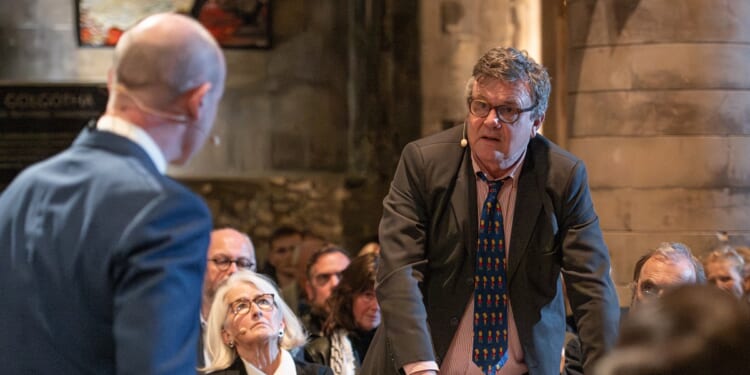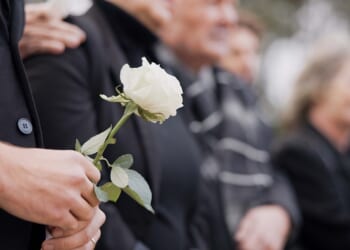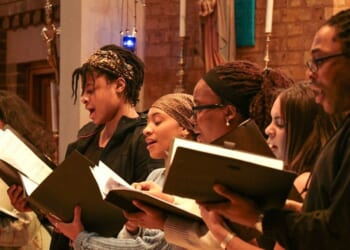WE HELD a Public Disputation in my church, St Bartholomew the Great, on Thursday of last week. This medieval tradition was revived three years ago: public figures debate some matter of Church or State. This year, to mark the anniversary of Benjamin Franklin’s living and working in the parish, we chose as a motion “This House believes that America is still a Shining City on a Hill.” Our former Ambassador to Washington, Dame Karen Pierce, squared off against Peter Hitchens, while the Corbynite economist Ann Pettifor challenged the Tory Lord Hannan.
People packed the church and were encouraged to intervene, boo, cheer, and cry “Shame!” or “Hear, hear!” They did so with gusto. They didn’t agree; nor were the words used placid or anodyne: some were accused of complicity with genocide, and others of supporting China and Russia. And yet good humour reigned.
In our incredibly contested political and cultural debates, this is a gift that the Church of England can truly give the nation: can we hold the space to disagree sincerely, robustly, and well? Archbishop Welby certainly hoped so, and tried to encourage us to model “disagreeing well”.
This is a genuine vocation for the Established Church, given to us by our history. From the very beginning, clerics disputed what the Church of England should be and what it should believe. While Continental universities abandoned disputation, Oxford and Cambridge (where most clergy trained) doubled down, eventually developing it into the tutorial system.
Parliament and Convocation were the elected bodies where Anglican laity, clergy, and bishops would fiercely debate church affairs, but generally followed Churchill’s maxim that “Jaw-jaw is better than war-war” — although theological disagreements led to civil war, when Puritans rose up to kill their King and fellow countrymen. The suppression of dissent which followed didn’t model “disagreeing well” either.
Nevertheless, the fact that the Church of England was intended to be a Church to which most of the population could assent meant that, across the centuries, we have had to sit alongside, pray among, and distribute holy communion to people with whom we profoundly disagree.
This has been our calling for 500 years and is desperately needed as political and civic ties fray — on both sides of the Atlantic, as assassinations on both sides of the political divide have hit American and British politics.
For the Church to rise to that occasion, however, we need to have the confidence of our congregations and the wider public that we can genuinely speak to all sides. This doesn’t mean that we drop our personal political positions, but it does mean that we be careful where we deploy them.
Engaging where people who disagree with us have the right and ability to contest our arguments is healthy (the House of Lords is a good example, as is X/Twitter). Proclaiming our political views six feet above contradiction is more hazardous. As C. S. Lewis remarked, it tells us only which newspapers are taken at the Rectory.
Last week’s Disputation was a little way of showing that the Church can help to provide the space to argue passionately but safely. Our history gives us the grounding to do that; how we behave in the present will determine whether we continue to have standing.
The Revd Marcus Walker is Rector of St Bartholomew the Great, Smithfield, in London.
Paul Vallely is away.

















